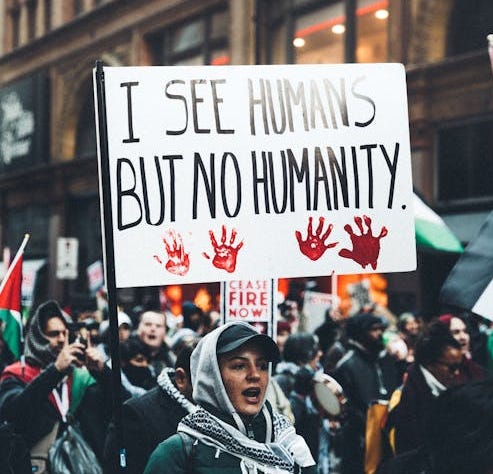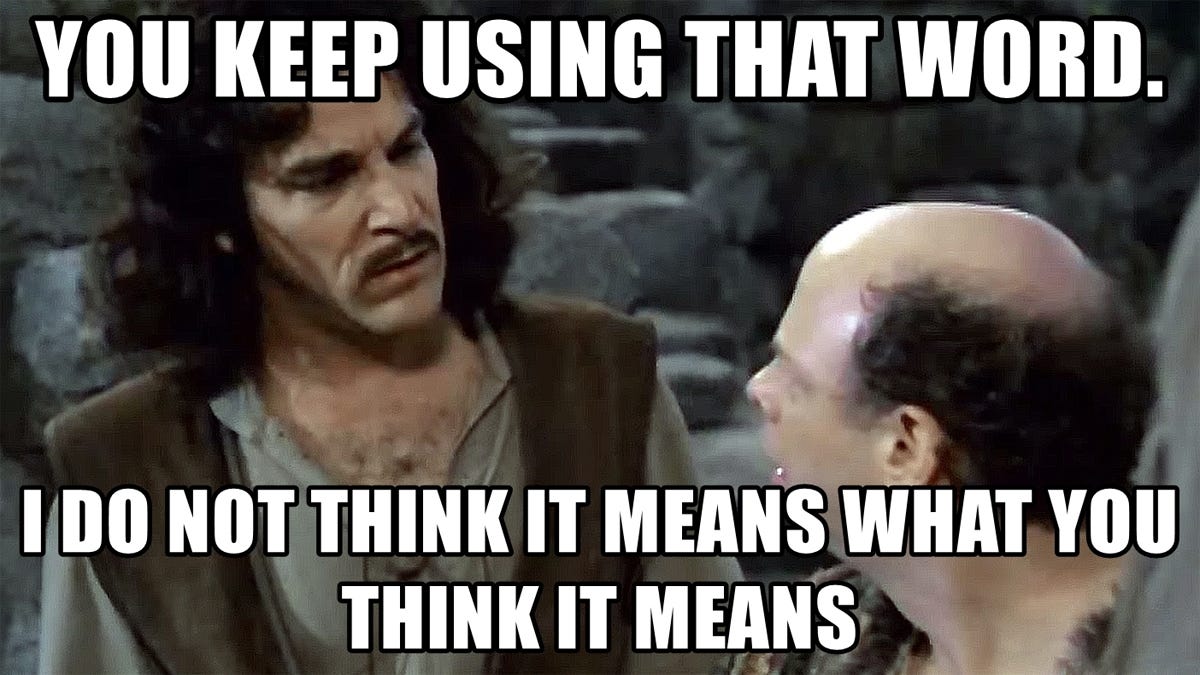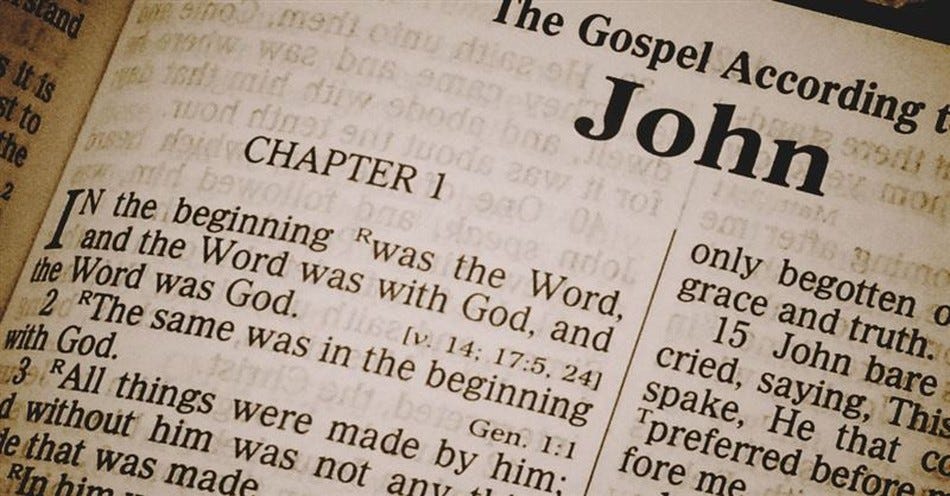Rhetorical Inflation: From Nazi to Genocide to Apartheid—The Death of Words
How rhetorical inflation empties our words of truth, corrodes dialogue, and blinds us to real evil—and how Christians can respond differently
5..Consider what a great forest is set on fire by a small spark. 6The tongue also is a fire, a world of evil among the parts of the body. It corrupts the whole body, sets the whole course of one’s life on fire, and is itself set on fire by hell. - James 3
Over the past few weeks, as I scrolled through my social media feeds, I felt a sense of sadness. Friends—good people, many of them Christians I admire—were throwing around words like Nazi, dictator, apartheid, and misogynist, not as carefully chosen terms but as blunt weapons, hurled across digital divides.
Words can become weapons rather than tools for truth.
What struck me wasn’t only the hostility—it was the cheapness. Words that once carried the weight and currency of history were being inflated and overextended, almost emptied of their true gravity. I realised I was watching not just ordinary disagreement, but rhetorical inflation at work, powered by the emotional currents of our polarised age.
Why Rhetorical Inflation Happens
We are living through a time of affective polarisation: when politics and culture stop being about competing ideas and become about competing identities. We don’t just disagree with “them”—we feel disgust, fear, and even hatred. And once strong emotions are in play, our language then escalates.
That escalation produces rhetorical inflation: the steady devaluation of words as we spend stronger and stronger currency to keep pace with our outrage. This devaluation of words is part of a broader dynamic of linguistic inflation.
Linguistic inflation is when our words are worn thin through overuse or exaggeration. In the constant churn of 24-hour news, social media, and instant messaging, it’s easy to reach for bigger and bigger words to sound persuasive, passionate, and certain. But the more we do this, the less weight our language carries.
Think of the everyday examples: “I gave 110%” or “I feel a million per cent better.” The result is that our speech becomes inflated, and its meaning devalued. However, on a day-to-day basis, these linguistic inflations can be relatively harmless.
However, Rhetorical Inflation is a more intense version of the same problem, with the disastrous results that we are now seeing writ large. Instead of exaggerating numbers, we inflate moral and political terms. A politician we dislike becomes a “dictator”, a Facebook personality a “Nazi”. The mechanics are identical: we escalate the language to hit harder, but in doing so, we evacuate those words of their actual moral weight and meaning.
Psychologically, harsh labels give cognitive closure and release the rush of tribal solidarity. Sociologically, it’s even clearer: platforms reward outrage, and extreme words travel way faster than careful ones.
The Dangers of Rhetorical Inflation
This rhetorical inflation is both dangerous and extremely harmful. It is not making things better but far worse. In particular:
Truth decay. If everyone is a “Nazi,” then no one is. When we throw the heaviest words at every disagreement, we strip them of their meaning. Historical terms that once helped us recognise genuine atrocities—slavery, genocide, apartheid—lose their sharpness. The tragedy is that when we do face real horrors, our moral vocabulary has already been over-spent. We can no longer speak with clarity or conviction, because the words we need have been devalued by casual overuse. Truth itself is weakened.
The tragedy of rhetorical inflation is that when we do face real horrors, our moral vocabulary has already been spent.
Dehumanisation. Rhetorical inflation doesn’t just damage language; it damages people. Once someone is labelled in inflated terms, they are reduced to the caricature of that label. The person in front of us is no longer a neighbour, a colleague, or even a fellow human being made in the image of God—they become “the Nazi,” “the fascist,” “the misogynist.” And when we reduce people in this way, we subtly remove the possibility of repentance, dialogue, or change. They are cast beyond redemption.
To dehumanise someone with a label is to abandon the gospel itself; Christians are never permitted to deny the image of God in another.
Dialogue collapse. Rhetorical inflation is addictive. Once one side escalates to “Fascists/Nazis”, the other side feels pressure to up the ante—perhaps to “Godless/Anti-family/Anti-Christians”. The exchange becomes an escalating verbal battle. And soon, there is no conversation left to have, only a contest of rhetorical force. Persuasion, compromise, and listening all completely vanish. Potential dialogue spirals into mutual condemnation, leaving no space for understanding or common ground.
Rhetorical inflation is like pouring petrol on the fire of the tongue (Jas 3:6).
Put together, truth decay, dehumanisation, and dialogue collapse are not just cultural trends; they are also deeply theological realities. They expose how quickly we surrender our speech to the powers of the age, allowing our words to become instruments of accusation instead of vehicles for truth, dignity, and reconciliation. When language is inflated, when neighbours are reduced to caricatures, and when conversation hardens into hostility, we step outside the terrain of Christian witness. The Christians cannot simply imitate this pattern.
Our vocation is to sanctify our speech: to speak truthful words, to see others through the lens of the imago Dei, and to hold our conversations open to the possibility of grace, instead of revenge.
The world already has an accuser. The Church is called to speak truth without inflation, words that heal rather than wound.
Spotting Inflated Speech
So how do we know when rhetorical inflation is at work? There are a few clear signs to spot it:
Escalation. This is where ordinary conflict gets framed in extreme historical terms. A disagreement over policy becomes “fascism,” a poor leadership decision becomes “dictatorship.” The gap between reality and rhetoric widens, and the words begin to carry more heat than any truth.
Definitional drift. Serious words lose their anchor in history and evidence. “apartheid,” “genocide,” and “Nazi”, “misogynist” all have specific, concrete meanings rooted in historical sufferings that generated them. When we use them carelessly, we are no longer naming reality but bending language to score a point. Put simply, before you use terms, ensure you know what the origins and meanings of those words are. And challenge others who bandy them about to show their working out for using them.
Thought-terminating clichés. Watch for the phrases that shut down dialogue: “End of,” “Educate yourself,” “There’s nothing to discuss.” These are simply refusals to enter into honest, good-faith dialogue. They mask insecurity with certainty, robbing us of the possibility of genuine understanding.
Each of these signs tells us the same thing: words are no longer being used to seek truth or build understanding. They are being used as weapons. And when Christians join that game, we forget our calling to speak with clarity, with proportion, and with grace.
Who Is Most Captive to Rhetorical Inflation?
The hard truth is that none of us is immune to Rhetorical Inflation. Some more so in particular:
Those who crave certainty and closure. For some, the most challenging aspect is living with tension and ambiguity. Harsh labels feel like resolution: “Now I know exactly who the enemy is.” It gives a sense of clarity and safety—but it’s a false clarity that comes at the expense of truth.
Communities carrying wounds. When a community has been hurt or traumatised, or perceives itself as being hurt and traumatised, the instinct is to protect itself. That can lead to broadening the perimeter of perceived threat, causing one to see danger everywhere. Rhetorical labels then become a kind of armour, and a way of keeping pain at bay. That instinct is understandable, but if left unchecked, it distorts our speech and our witness, and amplifies everyone’s pain.
High-engagement online users. The internet rewards outrage. Come on, we know this by now! Measured words disappear into the noise; extreme words get clicks and shares. The more time we spend online, the more our speech is shaped by these incentives—often without us even realising it.
Polarisation entrepreneurs. There are pundits, activists, and influencers whose livelihoods depend on keeping us angry, shocked and offended. Their business model is rhetorical inflation, and we are their content. For them, extreme language isn’t an accident—it’s the product they sell.
And let’s be clear: Christians fall into this, too. On the progressive side, the temptation is to reach for words like racist, fascist, Nazi, dictator, misogynist, etc., against anyone who questions their visions of justice. On the nationalist side, the labels shift to traitor, Marxist, liberal, for those who challenge an ideal of faith fused with country. Both mirror one another (I wrote an article explaining why this is so).
Both weaponise language to dominate rather than to illuminate.
A Theological Diagnosis
It would be easy to leave this whole conversation about rhetorical inflation in the realms of psychology and sociology. Those disciplines give us real insight, but as Christians, we need more than that. If our speech is part of our discipleship—and Scripture insists that it is—then we must also name what is happening theologically. Ultimately, how we engage with our words reveals our theological anthropology—our deepest identity and being, and who we are becoming.
Imago Dei. From the very beginning, Scripture tells us that every person is made in the image of God (Gen 1:26–27). That means our words never fall onto just a human being—they are spoken to image-bearers, those whom God has dignified.
When we reduce someone to a rhetorical label, we deny their dignity as image-bearers of God.
The Powers. Paul tells us that our struggle is not against flesh and blood but against the powers and principalities (Eph 6:12). These powers today include the cultural and digital systems that reward outrage, inflame anger, and deform our speech. Social media algorithms are not neutral; they discipline and train us. They push us toward rivalry and escalation, until our words look more like weapons of the world than witnesses to Christ. Without theological discernment, we don’t even notice—we get swept along by the tsunami of rhetorical ignition.
All of this matters because, for Christians, words are never “just words.” They either participate in God’s work of reconciliation or they echo the Accuser, and Father of Lies. That is why we need a theological accounting of rhetorical inflation: only theology reveals both the depth of the problem and the possibility of redemption.
Our words either serve reconciliation or echo the Accuser—there is no neutral ground.
If Satan is the father of rhetorical inflation, then every time we give in to inflated words, we are not just speaking carelessly—we are echoing the Accuser. That should stop us in our tracks. Our tongues are not neutral. They either participate in the reconciling Word made flesh, or they mirror the destructive speech of the enemy.
This is why the way we speak, especially as Christians, cannot be brushed aside as “just words.” To exaggerate, to caricature, to condemn with inflated labels is to step into the wrong economy - a false kingdom - of speech. It means we are no longer sanctifying our language, but letting it be co-opted by the powers.
Our speech will either echo the Accuser or witness to Christ. The choice is made every time we open our mouths.
A Christian Alternative
If rhetorical inflation is part of our fallenness, then Christians cannot settle for only diagnosing the problem. We are called to offer a different mode of engagement. Theology not only helps us explain what has gone wrong with our speech; it also points us toward the healing of language in Christ available to us.
Christ the Logos. John begins his Gospel by naming Christ as the Logos—the Word through whom all things were made (John 1:1–3). Our speech is never trivial in that light. It is meant to participate in the Word who creates, reveals, and redeems. If our words only wound and divide, they are out of step with Christ. To speak truthfully, proportionately, and in love is to echo the Logos in our own human register.
Every word we speak either echoes the Logos or drowns Him out in noise.
The Sanctification of Speech. Paul exhorts us: “Let your speech always be gracious, seasoned with salt” (Col 4:6). This is not rhetorical nicety but a spiritual discipline. Just as our bodies are sanctified as temples of the Spirit, so too our words must be sanctified as instruments of grace.
Faithful speech is not naive—it does not shrink from naming sin—but it names sin truthfully and proportionately, without inflation.
In other words, if it names and labels, it has a clear and truthful working out attached to it.
Sanctified speech is not soft speech; it is truthful speech held in the grip of grace.
The Ministry of Reconciliation. Paul describes the gospel as the ministry of reconciliation entrusted to us (2 Cor 5:18–19). Our words, then, are to be tools of that ministry. Harsh, rhetorically inflated labels foreclose reconciliation; they exile (cancel) people beyond the reach of grace. Christian speech is and should be cruciform: it tells the truth, but it does so in a way that keeps the door open for repentance, healing, and restoration.
Christian words are cruciform—truthful, but always bent toward reconciliation.
Practices of Faithful Speech. If this all sounds abstract, it doesn’t have to be. The Christian alternative is not silence, nor is it niceness. It is speaking as those who know our words can either echo the Accuser or echo the Word made flesh.
Christians have concrete practices to help us resist rhetorical inflation:
Name behaviour, not essence. Condemn the act before condemning the person.
Define carefully. Don’t dilute serious words from their actual meaning.
Practice slow speech. “Quick to listen, slow to speak” (Jas 1:19).
Aim for restoration. Rebuke should seek repentance, not exile.
Love enemies. Jesus forbids language that forecloses reconciliation (Matt 5:43–48).
Our vocabulary is part of our discipleship—words are practices, not just expressions.
For leaders: before using a heavy label, ask—am I naming this to serve truth and open the way for restoration, or to win a fight and express something ugly within me?
A Pastoral Word
We live in a time when words are cheapened every day. Rhetorical inflation corrodes our moral vocabulary, dehumanises neighbours, and turns dialogue into combat. And Christians, if we’re honest, have often joined in. I know I have.
But this is also where possibility lies. In a culture addicted to inflated speech, imagine the witness of communities that speak differently—words measured, gracious, proportionate, and truthful. Speech that corrects without caricature, names wrong without denying dignity, and leaves space for reconciliation.
This isn’t just a linguistic cosmetic makeover. It is a recovery of Christian distinctiveness. Every time we resist Rhetorical Inflation and sanctify our speech, letting our thoughts and words be crucified, we reveal another way of being human—one patterned after Christ, the Word made flesh.
Our words aren’t just air—they’re embers; in Christ, even whispers can set the world on fire with reconciliation.
I began this article, noting that Rhetorical Inflation is like pouring fuel on the fire of the tongue (Jas 3:6). However, I genuinely believe, and I am trying to grasp an alternative possibility.
What if words weren’t just flames online, but sparks in the dark?
What if every syllable we breathed was tinder for God’s fire, waiting to ignite? This possibility before us is not slight—it is cosmic in its scope and nature. What if our chatter, our stutter, our tweets and texts, were tuned into the frequency of the Logos, the Word behind all words? What if in Christ, our language was hacked, rebooted, re-coded? Where the broken became beautiful and words that once wounded now wove worlds of reconciliation.










Jason, thank you for naming this tendency that is borne out of fear. It is good to remember, indeed, that all are imago dei.
I wonder, in retrospect, at what point would it have been appropriate - or if it would have been appropriate at all - to name the perpetrators of apartheid in SA, or those inflicting genocide in Rwanda and Germany? When does naming and articulating serve a purpose? Or does it? How do we know what that moment or line may be? Does it serve the perpetrators? My guess is it may serve the victims, so they do not feel invisible. And when is it appropriate today? What purpose might it serve?
Just thinking out loud here. Thanks for this article.